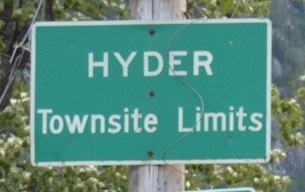 Alaska’s senior senator sent another letter this week to Canada’s ambassador to the United States, Gary Doer, stressing the importance of keeping the border open 24 hours a day between Hyder, Alaska, and Stewart, British Columbia.
Alaska’s senior senator sent another letter this week to Canada’s ambassador to the United States, Gary Doer, stressing the importance of keeping the border open 24 hours a day between Hyder, Alaska, and Stewart, British Columbia.
Starting April 1, that border crossing has been closed daily between midnight and 8 a.m.
Sen. Lisa Murkowski’s communications director, Matthew Felling, speaking from Washington, D.C., said Wednesday that “Sen. Murkowski is clearly bird-dogging this issue, because Alaskans aren’t done with it. There is no resolution. It’s putting health at risk, and the health of the local community economy at risk.”
The border crossing is the only road connecting the tiny community of Hyder to the outside world. The approximately 100 residents of Hyder depend on nearby Stewart for medical services, among other needs.
In addition, Hyder is home to a popular bear viewing facility, run by the U.S. Forest Service. Because Hyder is so small, tourists usually stay in the larger community of Stewart and drive the short distance to Hyder early in the morning to watch bears.
Felling said the first letter Murkowski penned to Canada’s ambassador was before the new border crossing hours took effect, and warned of the possible repercussions for both communities.
“Now that we’re seeing the actual impacts play out, and it’s actual and not theoretical, Sen. Murkowski wanted to circle back and share with the Canadian government the details of the shortcomings of this we’ll-get-back-to-you approach,” Felling said.
The solution that the Canadian government has provided for after-hours medical service is a telephone connection. Individuals with an emergency need can call Canada Border Services, and get the combination to a lock box that has a key to open the gate.
Felling said that’s insufficient.
“Convenience is not the issue here. Health, well-being and potential lives could be at risk,” he said. “If there is a wound or there is a heart attack, you don’t want to wait for the phone to get answered and you don’t want to wait to figure out how to get the key in the keyhole to lift up this gate on your own.”
Then there’s the economic factor. The U.S. Forest Service has weighed in on this issue. In a response to an inquiry from Murkowski’s office, Forest Service officials said that tourists usually try to arrive at the Fish Creek Observatory early in the morning for the best bear-viewing opportunities; the new border hours will affect that tourist traffic.
Felling said Hyder’s tourism is good for both Alaska and Canada.
“The tourists who go across the border to watch bears come back to spend their money at the inns in Canada, in Stewart,” he said.
In a written response to Murkowski’s first letter of concern, Ambassador Doer said that emergency first responders all have keys to the border gate, and that the closure time – midnight to 8 a.m. — was chosen because of the light traffic during those hours.
Felling said that doesn’t factor in some important considerations.
“That ignores the fact that the people who are crossing the border into Canada are often in an urgent medical rush,” he said. “And the time period where they looked at these numbers was most likely outside of the tourist season, because 6-8 a.m. is the high peak demand hours for tourists to head into Hyder to watch bears, which is the draw.”
Felling said Hyder’s reputation as a tourism destination is at stake, and there could be dire financial repercussions for both Hyder and Stewart in the long run.





